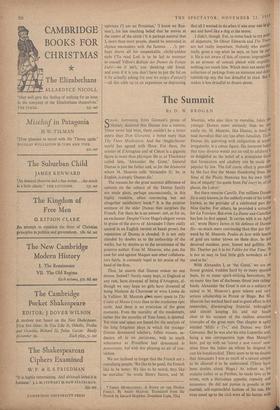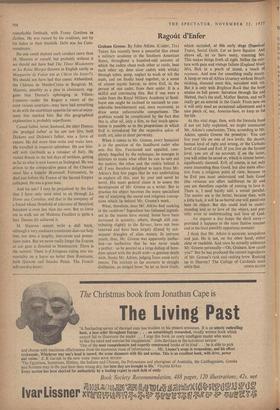The Summit
By D. W BROGAN CIHAW, borrowing from Gounod's praise of a Mozart, declared that Dumas was a summit. There never had been, there couldn't be a better opera than Don Giovanni, a better story than The Three Musketeers. And the 'Anglo-Saxon' world has agreed with Shaw. For them, the creator of d'Artagnan and of Chicot is a gigantic figure in more than physique. He is, as Thackeray called him, 'Alexander the Great.' General Dumas is just the father and, as for the dramatist whom M. Maurois calls 'Alexandre II,' he, in English, is simply 'Dumas fils.'
The reasons for the great national difference of opinion on the subject of the Dumas family are made plain, perhaps unconsciously, in this highly readable, often convincing but not altogether satisfactory book.* It is the exterior estimate of the elder Dumas that surprises the French. For them he is an amuser; not, as for us, an enchanter. Despite Victor Hugo's elegant verses in praise of the ceuvre of Alexandre I (here oddly quoted in an English version as banal prose), the reputation of Dumas is clouded. It is not only clouded by doubts as to the authorship of the works, but by doubts as to the seriousness of the putative author. Even M. Maurois, who puts the case for and against Maquet and other collabora- tors fairly, is curiously tepid in his praise of the head of the firm.
Thus, he asserts that Dumas makes no one dream. Indeed? Surely many boys, in England at any rate, have dreamed of being d'Artagnan, al- though we may hope no girls have dreamed of being Madame de Chevreuse or even Louise de la Valliere. M. Maurois gibes more space to The Count of Monte Cristo than to the musketeer epic cycle. And there is no evocation of the great moments. Even the morality of the musketeers, rather like the morality of Tom Jones, is ignored. Yet time and space are found for the analysis of the long forgotten plays in which the younger Dumas denounced adultery, fallen women, se- ducers, all la vie parisienne, with as much vehemence as Proudhon had denounced la pornocratie, but with less pleasing an air of con- viction.
We are inclined to forget that the French are a moralising people. 'We like to be good, the•French like to be better. We like to be moral, they like to moralise.' So wrote Henry James, and M.
* THREE MUSKETEERS : A STUDY OF THE DUMAS FAMILY. By Andre Maurois. Translated from the French by Gerard Hopkins. (Jonathan Cape, 35s.) Maurois, who also likes to moralise, takes the younger Dumas more seriously than we can easily do. M. Maurois, like Dumas, is fond of neat tnoralites that are too often banalites. To US Dumas fils, quivering with indignation at sexual irregularity, is a comic figure. His innocent belief that easy divorce would put an end to adulterY is as delightful as the belief of a procurator-fiscal that fornication and adultery can be made un' popular by law. The full comic effect is provided by the fact that the Moses thundering from the Sinai of the Plairie Monceau has his own 'little den of iniquity' (to quote from Pal Joey) in, of all places, the Loiret !
But there remains Camille. For millions Dumas fils is only known, in the unlikely event of his being known, as the provider of a celebrated part for Miss Garbo. For others, he provided a scenario for La Traviata. But even La Dame aux Camelia, has lost its first appeal. 'It carries with it an April air,' wrote Henry James in his defence of Dumas fils—so much more convincing than that put for- ward by M. Maurois. Poules de luxe with hearts of gold are rather blown on these days. So are deceived maidens, poor, honest and gullible. As Mr. Thurber put it in his Fables for Our Time, it is not so easy to fool little girls nowadays as it used to be.'
With Alexandre I, or 'the Great,' we are on firmer ground, trodden hard by so many spurred heels, by so many spark-striking horseshoes, by so many tiny feet of duchesses thrust into riding- boots. Alexander the Great is not as a subject so suited to M. Maurois's great talents and very serious scholarship as Proust or Hugo. But M. Maurois has worked hard and to good effect in his researches, disentangling financial imbroglios and almost keeping his and our heads clear in his account of the endless amorous triumphs of the great man. One chapter is aptly entitled 'Mille e Tre,' and Dumas was Don Giovanni. But he was also his own Leporello and, being a less introspective type than Mozart's hero, put up with no `vorrei e non vorrei' non- sense from the ladies on whom he deigned to cast his handkerchief. There seem to be no doubts that Alexandre I was as much of a sexual athlete as he allowed it to be understood. (There have been doubts about Hugo.) As robust as his mulatto father or as Porthos, he made love as he wrote, with a Herculean appetite, capacity and innocence. He did not pursue la gonella in the morbid, self-reproachful fashion of his son. He even stood up to the civil wars of his harem with
remarkable fortitude, with Fanny Gordosa as Zerlina. He was ruined by his creditors, not by his ladies or their kinsfolk. Debt was his Com- mendatore.
No one could deplore such conduct more than M. Maurois or myself, but probably without it we should not have had The Three Musketeers or La Reine Margot -(known in English surely as Marguerite de Valois not as Chicot the Jester?). We should not have had that comic Abbotsford, the Château de Monte-Cristo at Bougival. M. Maurois, possibly as a plea in abatement, sug- gests that Dumas's upbringing in Villers- Cotterets—under the Regent a resort of the most vicious courtiers—may have had something to do with the exorbitant appetite for sexual enjoy- ment that marked him. But this geographical explanation is probably superfluous.
Casual father, lover, husband, the elder Dumas, the `prodigal father' as his son saw him, both Dickens and Dickens's father, was a force of nature. He did more than write and make love. He travelled in imperial splendour. He saw him- self with Garibaldi as a remakes of Italy. He visited Russia in the last days of serfdom, getting as far as what is now known as Stalingrad. He was driven to the comparative peace of the Channel coast like a happier Brummell. Fortunately, he died just before the France of the Second Empire collapsed. He was a great man.
And his son? I may be prejudiced by the fact that I have only once tried to sit through La Dame aux Camelias, and that in the company of a friend whose threshold of tolerance of theatrical boredom is even less than my own. But to force me to walk out on Madame Feuillere is quite a feat. Dumas fi/s achieved it.
M. Maurois cannot write a dull book, although a very mediocre translation does not help him, nor does a lengthy, inaccurate and preten- tious index. But we never really forget the Everest as our gaze is directed to Montmartre. There is the summit. There is d'Artagnan riding into im- mortality on a horse no better than Rosinante, both Quixote and Sancho Panza. The French will one day learn !











































































 Previous page
Previous page